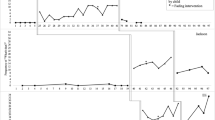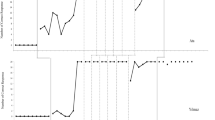Abstract
Verbal initiations, such as questions, are essential components of social conversation often lacking in children with autism. Building on research showing that single questions can be taught in isolation, this study used a multiple baseline design to investigate whether a self-management intervention was effective for teaching concurrent acquisition and discrimination of three social questions in the context of conversation. Following intervention, participants rapidly increased their appropriate use of all three questions in a conversational context and maintained these gains over time. The participants also used questions appropriately with partners uninvolved in treatment. Additionally, the occasional presence of appropriate questions during baseline coupled with rapid improvement during intervention support theories that a lack of question-asking may be motivation-based rather than ability-based.

Similar content being viewed by others
References
Alexander, D., Wetherby, A., & Prizant, B. (1997). The emergence of repair strategies in infants and toddlers. Seminars in Speech and Language, 18(3), 197–212.
American Psychiatric Association. (2000). Diagnostic and statistical manual of mental disorders (4th ed., text revision). Washington, DC: American Psychiatric Association.
Baldwin, D. A., & Moses, L. J. (1996). The ontogeny of social information gathering. Child Development, 67(5), 1915–1939.
Bauminger, N., & Kasari, C. (2000). Loneliness and friendship in high-functioning children with autism. Child Development, 71(2), 447–456.
Betz, A. M., Higbee, T. S., & Pollard, J. S. (2010). Promoting generalization of mands for information used by young children with autism. Research in Autism Spectrum Disorders, 4, 501–508.
Bloom, L., Merkin, S., & Wootten, J. (1982). “Wh”-questions: Linguistic factors that contribute to the sequence of acquisition. Child Development, 53(4), 1084–1092.
Boettcher, M. A. (2004). Teaching social conversation skills to children with autism through self-management: An analysis of treatment gains and meaningful outcomes. Unpublished doctoral dissertation, Santa Barbara: University of California.
Brinton, B., & Fujiki, M. (1989). Conversational management with language-impaired children: Pragmatic assessment and intervention. Gaithersburg, MD: Aspen Publishers.
Brown, R. (1968). The development of wh-questions in child speech. Journal of Verbal Learning and Verbal Behavior, 7(2), 279–290.
Cohen, J. (1988). Statistical power analysis for the behavioral sciences (2nd ed.). Hillsdale, NJ: Lawrence Earlbaum Associates.
Endicott, K., & Higbee, T. S. (2007). Contriving motivating operations to evoke mands for information in preschoolers with autism. Research in Autism Spectrum Disorders, 1, 210–217.
Fox Tree, J. E. (2002). Interpreting pauses and ums at turn exchanges. Discourse Processes, 34(1), 37–55.
Frea, W. D. (1995). Social-communicative skills in higher-functioning children with autism. In R. L. Koegel & L. K. Koegel (Eds.), Teaching children with autism: Strategies for initiating positive interactions and improving learning opportunities (pp. 53–66). Baltimore: Paul H. Brookes Publishing Co.
Golman-Eisler, F. (1968). Psycholinguistics: Experiments in spontaneous speech. New York: Academic Press.
Halle, J., & Meadan, H. (2007). Assessing early communication of young children with autism and other developmental disabilities. Topics in Early Childhood Special Education, 27, 49–61.
Hung, D. W. (1977). Generalization of “curiosity” questioning behavior in autistic children. Journal of Behavior Therapy and Experimental Psychiatry, 8(3), 237–245.
Hurtig, R., Ensrude, S., & Tomblin, J. B. (1982). The communicative function of question production in autistic children. Journal of Autism and Developmental Disorders, 12(1), 57–69.
Kazdin, A. E. (2011). Single-case research designs: Methods for clinical and applied settings (2nd ed.). New York, NY: Oxford University Press.
Kearsley, G. P. (1976). Questions and question asking in verbal discourse: A cross-disciplinary review. Journal of Psycholinguistic Research, 5(4), 355–375.
Klin, A., & Volkmar, F. V. (2000). Treatment and intervention guidelines for individuals with Asperger Syndrome. In A. Klin, F. Volkmar, & S. Sparrow (Eds.), Asperger Syndrome (pp. 340–466). New York: Guilford Press.
Koegel, L. K. (2000). Interventions to facilitate communication in autism. Journal of Autism and Developmental Disorders. Special Issue: Treatments for people with autism and other pervasive developmental disorders: Research Perspectives, 30(5), 383–391.
Koegel, R. L., Bimbela, A., & Schreibman, L. (1996). Collateral effects of parent training on family interactions. Journal of Autism and Developmental Disorders, 26(3), 347–359.
Koegel, L. K., Camarata, S., Valdez-Menchaca, M. C., & Koegel, R. L. (1998). Setting generalization of question-asking by children with autism. American Journal on Mental Retardation, 102(4), 346–357.
Koegel, R. L., & Egel, A. L. (1979). Motivating autistic children. Journal of Abnormal Psychology, 88(4), 418–426.
Koegel, R. L., & Koegel, L. K. (2006). Pivotal response treatments for autism. Baltimore, Maryland: Paul H. Brookes Publishing Co.
Koegel, R. L., & Koegel, L. K. (2012). The PRT pocket guide. Baltimore, MD: Paul H. Brookes.
Koegel, L. K., Koegel, R. L., Green-Hopkins, I., & Barnes, C. C. (2010a). Brief report: Question-asking and collateral language acquisition in children with autism. Journal of Autism and Developmental Disorders, 40(4), 509–515.
Koegel, L. K., Koegel, R. L., & Parks, D. R. (1992). How to teach self-management to people with severe disabilities: A training manual. Santa Barbara: University of California.
Koegel, L. K., Koegel, R. L., Shoshan, Y., & McNerney, E. (1999). Pivotal response intervention II: Preliminary long-term outcome data. Journal of the Association for Persons with Severe Handicaps, 24(3), 186–198.
Koegel, R. L., Koegel, L. K., Vernon, T. W., & Brookman-Frazee, L. I. (2010b). Empirically supported pivotal response treatment for children with autism spectrum disorders. In J. R. Weisz & A. E. Kazdin (Eds.), Evidence-based psychotherapies for children and adolescents (pp. 327–342). New York, NY: The Guilford Press.
Koegel, L. K., Singh, A. K., & Koegel, R. L. (2010c). Improving motivation for academics in children with autism. Journal of Autism and Developmental Disorders, 40(9), 1057–1066.
Koegel, R. L., Tran, Q., Mossman, A., & Koegel, L. (1994). Incorporating motivational procedures to improve homework performance. In R. Koegel & L. Koegel (Eds.), Pivotal response treatments for autism (pp. 81–91). Baltimore, ML: Paul H. Brookes Publishing Co.
Lechago, S. A., Carr, J. E., Grow, L. L., Love, J. R., & Almason, S. M. (2010). Mands for information generalize across establishing operations. Journal of Applied Behavior Analysis, 43, 381–395.
Marans, W. D., Rubin, E., & Laurent, A. (2005). Addressing social communication skills in individuals with high-functioning autism and Asperger syndrome: Critical priorities in educational programming. In F. Volkmar, R. Paul, A. Klin, & D. Cohen (Eds.), Handbook of autism and pervasive developmental disorders (pp. 42–69). Hoboken, NJ: Wiley.
McTear, M. F. (1985). Children’s conversations. Malden, MA: Blackwell Publishers.
Oke, N. J., & Schreibman, L. (1990). Training social initiations to a high-functioning autistic child: Assesment of collateral behavior change and generalization in a case study. Journal of Autism and Developmental Disorders, 20(4), 479–497.
Palmen, A., Didden, R., & Arts, M. (2008). Improving question asking in high-functioning adolescents with autism spectrum disorders: Effectiveness of small-group training. Autism, 12(1), 83–98.
Paul, R. (2003). Promoting social communication in high functioning individuals with autistic spectrum disorders. Child and Adolescent Psychiatric Clinics of North America, 12(1), 87–106.
Paul, R. (2008). Interventions to improve communication in autism. Child and Adolescent Psychiatric Clinics of North America, 17(4), 835–856.
Seligman, M. E. P. (1972). Learned helplessness. Annual Review of Medicine, 23, 407–412.
Sparrow, S. S., Cicchetti, D. V., & Balla, D. A. (2005). Vineland Adaptive Behavior Scales (2nd ed.). Circle Pines, MN: American Guidance Service.
Stivers, T., Enfield, N. J., Brown, P., Englert, C., Hayashi, M., Heinemann, T., et al. (2009). Universals and cultural variation in turn-taking in conversation. Proceedings of the National Academy of Sciences, 106(26), 10587–10592.
Stone, W. L., Ousley, O. Y., Yoder, P. J., Hogan, K. L., & Hepburn, S. L. (1997). Non-verbal communication in two- and three-year-old children with autism. Journal of Autism and Developmental Disorders, 27(6), 677–696.
Taylor, B. A., & Harris, S. L. (1995). Teaching children with autism to seek information: Acquisition of novel information and generalization of responding. Journal of Applied Behavior Analysis, 28(1), 3–14.
Volden, J. (2004). Conversational repair in speakers with autism spectrum disorder. International Journal of Language and Communication Disorders, 39, 171–189.
Watson, P. J., & Workman, E. A. (1981). The non-concurrent multiple baseline across individuals design: An extension of the traditional multiple baseline design. Journal of Behavior Therapy and Experimental Psychiatry, 12, 257–259.
Wetherby, A. M., Alexander, D., & Prizant, B. (1998). The ontogeny and role of repair strategies. In A. Wetherby, S. Warren, & J. Reichle (Eds.), Transitions in prelinguistic communication (pp. 135–159). Baltimore: Paul H. Brookes.
Wetherby, A. M., & Prizant, B. M. (1993). Profiling communication and symbolic abilities in young children. Communication Disorders Quarterly, 15, 23–32.
Wetherby, A. M., & Prutting, C. A. (1984). Profiles of communicative and cognitive social abilities in autistic children. Journal of Speech and Hearing Research, 27, 364–377.
Acknowledgments
The authors wish to express appreciation to Eunice Feng for her assistance with data analysis. This research and preparation of the manuscript were partially supported by NIH research grant #DC010924 awarded to Robert L. Koegel, Ph.D. Lynn and Robert Koegel are also partners in the firm Koegel Autism Consultants, LLC. We would also like to express our sincere appreciation to the families that participated in this research.
Author information
Authors and Affiliations
Corresponding author
Rights and permissions
About this article
Cite this article
Doggett, R.A., Krasno, A.M., Koegel, L.K. et al. Acquisition of Multiple Questions in the Context of Social Conversation in Children with Autism. J Autism Dev Disord 43, 2015–2025 (2013). https://doi.org/10.1007/s10803-012-1749-8
Published:
Issue Date:
DOI: https://doi.org/10.1007/s10803-012-1749-8




